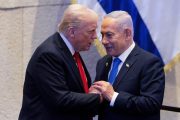As speculation continues over possibilities of a unilateral attack by Israel on Iran’s nuclear program, the Obama administration is sending a clear signal that it is prepared to work with the victorious factions arising through the Middle East in the aftermath of the Arab Spring — including self-avowed “Islamists.” In the words of Secretary of State Hillary Clinton (left), “what parties call themselves is less important to us than what they actually do.”
According to a story from the Associated Press, the Obama administration is now openly embracing the Islamist shift which is taking place as a result of the past year’s series of revolutions that have swept through a series of Islam-dominated countries. Speaking to the National Democratic Institute, Clinton made it clear that a profound shift is taking place in American foreign policy. In the words of the AP story:
Clinton offered a forthright embrace of the democratic changes enveloping North Africa and the Middle East at a time when the euphoria of the successful revolutions from Egypt to Libya is giving way to the hard and unprecedented work of creating stable democracies.
After decades of partnering dictators throughout the region, her message was that the U.S. would approach the new political landscape with an open mind and the understanding that long-term support for democracy trumps any short-term advantages through alliances with authoritarian regimes.
While she reached out to the religious-rooted parties expected to gain power in Egypt, Tunisia and elsewhere, she said nothing about changing U.S. policies toward Hezbollah and Hamas, which have performed well in Lebanese and Palestinian elections but are considered foreign terrorist organizations by the United States.
Given the significance of the shift in American policy, Clinton’s silence regarding Hezbollah and Hamas might actually speak quite loudly; unless the administration quickly signals that U.S. foreign policy toward those parties remains unchanged, there is every reason to expect that they will be included in the new approach to the entire region.
Clinton’s comments come in the context of growing concerns about the role of the Obama administration in advancing the agendas of radical Islamic parties in the aftermath of the Arab Spring. As Joe Wolverton recently wrote for The New American:
Credible investigative reports indicate that there are many Islamic extremists among the claques of democratic leaders now seizing control of the Arab governments that have suffered the Spring. Some describe these self-proclaimed “jihadists” as “Trojan Horses” being led inside the walls of freedom surreptitiously as part of a greater strategy to infiltrate the new regimes and thereby tighten the grip of Islamic militancy throughout the region.
There is evidence that President Obama is aiding and abetting these designing democrats in their quest to expand the scope of Islamic fundamentalism. In Libya, for example, the United States aided the National Transitional Council (NTC) in drafting a pro-Sharia constitution, as well as providing more direct and lethal support of the insurgents in the form of missiles and munitions.
While the Associated Press noted that Clinton “welcomed the Islamist party Ennahda’s strong showing in ‘an open, competitive election’ in Tunisia last month,” Wolverton observed that this party is “a group ideologically indistinguishable from the Muslim Brotherhood. … Reports from that country indicate that the group’s primary aim is to dismantle wholly all vestigial remnants of French civil institutions and laws and replace them with a fundamentalist version of Sharia.”
While the Arab Spring has meant a wave of violence being unleashed against Christian minorities in several countries — including, most prominently, Egypt — Clinton simply called on the rising Islamic parties to act as if they are Western countries:
Religious and secular parties alike “must reject violence. They must abide by the rule of law and respect the freedoms of speech, religion, association and assembly. They must respect the rights of women and minorities,” Clinton said. “They must let go of power if defeated at the polls.”
“In other words,” Clinton added, “what parties call themselves is less important to us than what they actually do.”
Clinton is, of course, aware that the forces now ruling Egypt appear to have little interest in a transfer of power, but she spoke of their rule in words which were mildly critical, at best: “If, over time, the most powerful political force in Egypt remains a roomful of unelected officials, they will have planted the seeds for future unrest,” Clinton said. “Egyptians will have missed a historic opportunity.” In this regard, Clinton could as well have been describing the administration in which she is serving. Obama’s astounding array of “czars” and a federal bureaucracy of “unelected officials” control more and more aspects of American life from one presidency to the next.
While the Obama administration shifts its policy toward the rising Islamist parties of the Middle East, certain elements within the government of Israel — including Prime Minister Benjamin Netanyahu and Defense Minister Ehud Barak — appear to be planning a preemptive attack on Iran with the goal of eliminating that nation’s nuclear weapons program. Opinion is — to say the least — strongly divided in Israel over such a preemptive attack. In June 1981, Israel made a somewhat similar attack against Iraq’s nuclear program, conducting an air strike against a 70-megawatt nuclear reactor near Baghdad. However, Iranian officials are threatening that such an attack today could unleash a regional war. While some American politicians — including Herman Cain — subscribe to the dubious notion that such a war could be in the best interests of the United States, what seems certain is that given the diametrically opposed policies of the Obama and Netanyahu governments, the clear division between the foreign policies goals and interests of the two nations is growing.
What remains to be seen is whether any future U.S. presidential administration will be able to return to the more stable policy of America’s past, avoiding “entangling alliances” with foreign governments that are not in the long-term interests of these United States.




